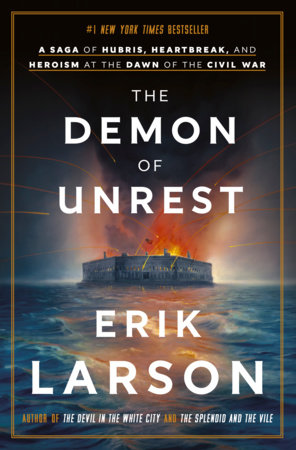READERS GUIDE
1. Have you read other books on the Civil War? Did Erik Larson’s book make you think differently about it? If so, how?
2. Why was Fort Sumter so crucial to all parties? What did it symbolize before and after South Carolina seceded from the Union?
3. Why does President Buchanan seem blindsided by secession? Why were both sides provoked by his final speech to Congress? How did it help pave the way for South Carolina and others to leave the Union?
4. How do the events of 1860–61 parallel the present day?
5. In the introduction, Larson notes, “At the heart of the story is a mystery that still confounds: How on earth did South Carolina, a primitive, scantily populated state in economic decline, become the fulcrum for America’s greatest tragedy?” Does the book solve that mystery? What answers did you see?
6. Talk about the city of Charleston. How had it changed over the nineteenth century? What was at stake for “the chivalry,” the state of South Carolina, and the Confederacy by 1860?
7. The title of the book comes from a letter written in 1860 by Dennis Hart Mahan, in reference to the long reign of the planter class: “But when commerce, manufacturers, the mechanic arts disturbed this condition of things, and amassed wealth that could pretend to more lavish luxury than planting, then came in, I fear, this demon of unrest which has been the utmost sole disturber of the land for years past.” What does “this demon of unrest” describe?
8. What light does the book shed on Abraham Lincoln? Does it reinforce or change your view of him?
9. Mary Chesnut’s diary gives a woman’s perspective on the unfolding events. What did you learn and find most interesting about her character?
10. Why were Southern planters affronted by the abolitionist reports of—and novels like Harriet Beecher Stowe’s Uncle Tom’s Cabin
about—plantation life? Why were they convinced that, in slavery, they had created an ideal society?
11. Examples throughout the book suggest that Northerners, including the likes of Abraham Lincoln, did not understand Southern society. What did they fail to consider in the lead-up to the start of the Civil War?
12. “Cotton is king” was a widely repeated phrase at the time. Why was the South so certain that the North would back down from ending slavery? What made them think the world would follow suit?
13. Discuss Major Robert Anderson. How do his actions resonate with his soldiers, his superiors, and the rest of the country? What do you, as a reader, think of them?
14. While Lincoln tried to reassure Southerners that he wouldn’t change the current slave-labor system, Senator William Seward stated unequivocally that a slave system and a free-labor system could not co-exist: “It means that the United States must and will, sooner or later, become either entirely a slaveholding nation, or entirely a free-labor nation.” Why was this such a dangerous/brave/shocking thing to say? What does it reveal about the status quo of the day?
15. What was the public sentiment around Lincoln? What did his peers think about his political acumen? Why do you think Lincoln had his own doubts of his capacity to be president?
16. How much have the Democrat and Republican parties changed? What do the parties of 1860 look like when compared with those of today?
17. Discuss the concept of honor as it pertains to the players on each side. How does it inform their character? How does the South reconcile their concept of honor with the horrors of slavery?
18. To today’s reader, the Civil War seemed inevitable. Yet, at the time, people seemed to have little inkling of what was to come. Why did they think conflict would be brief, or unlikely to occur at all?
19. Talk about the campaign of disinformation that permeated 1860. What falsehoods endured? Is that similar to today?

